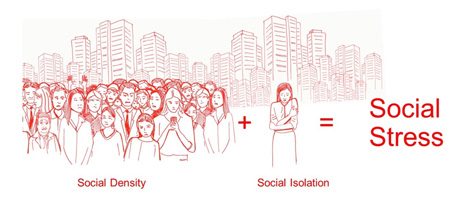Stress in the City
 © iStock
© iStock
Prof. Dr. Mazda Adli is a specialist in psychiatry and psychotherapy at Freie Universität (FU) Berlin. Adli is chief physician at the Fliedner Klinik in Berlin and directs the mood disorder research group at the Department of Psychiatry and Psychotherapy at Charite Campus Berlin Mitte. As one of Germany’s leading stress researchers, Professor Adli has published numerous books – among them Stress and the City, which discusses the psychological effects of life in an urban environment.
DWIH: Thanks for taking the time to answer our questions, Dr. Adli! Your work illustrates for us some of the stress-related risk factors which are triggered differently in individuals living in cities. Could you explain to us what these are and whether this means that living in cities makes us sick?
Adli: It’s quite plausible to us that city living means an increase in stress exposure, and we surely know that stress can have an impact on our health and wellbeing. Yet, urban populations do in average live under improved conditions – they are wealthier and have better access to education, sanitation, contraception and general health care. It’s an ambivalent situation.

"The major contributors to social stress in cities are social density and social isolation."Dr. Mazda Adli
According to our hypothesis in my research group, the major contributors to social stress in cities are social density and social isolation, especially if they come with a low sense of environmental mastery in the individual, i.e. feeling capable of influencing the environment according to one’s own needs. Both variants of social stress – density and isolation – are well characterized health challenges: Social density can mean a constant threat for the social order we live in. Overcrowding can induce stress and illness in species ranging from insects to rodents to primates, including humans. And social isolation is associated with increased premature mortality – with a stronger effect than smoking, alcohol abuse or obesity.
DWIH: What are the long-term health risks of urban living?
Adli: Urban living and upbringing have been shown to increase the risk for some major psychiatric diseases. The risk for schizophrenia is at least twice as high in city dwellers. And it even comes with a dose-response-relationship for the amount of time one has grown up in the city. Plus: the larger the city you have been raised in the higher your risk for schizophrenia later as an adult. That’s a double dose-response relationship. Studies also show that the risk for schizophrenia may change accordingly if an individual moves between urban and rural areas during childhood. The risk for depression is about 1.5-fold and for anxiety disorders about 1.2-fold in urban environments. But interestingly there seems to be no difference for substance abuse between cities and the country side.

DWIH: Do you think urban dwellers are stressed to different degrees in different cities around the globe? Even within the same city, are people of different demographics or in certain areas at higher risk of urban stress?
Adli: Interestingly, a study published in 2018 based on WHO data from 42 low- and middle-income countries could not find the urban-rural risk difference – at least with regard to schizophrenia and psychotic symptoms. This is remarkable as many of the booming and rapidly growing mega-cities are in these regions. An explanation could be that the urban-rural risk difference which has been shown in the countries of the global north is somehow associated with the “social fabric” in the cities of our regions. Countries of the global north are very much based on the development of the individual -the flipside of which might be social disintegration.
There also enormous differences within cities with regard to social stress exposure. People with a pre-existing higher risk for experiencing social isolation, such as loneliness or social exclusion by being part of a minority and with unequal access to the advantages and resources of urban life are at higher risk of suffering from mental-ill health.
DWIH: Your work and research focus on the interrelation of living in large cities and individual stress reactions. In order to investigate better into this, you have encouraged the foundation of a research center on “Neuro-urban studies” (dt.: “Neuro-Urbanistik”). Could you expand on what you mean by this term?
Adli: In 2015 we have founded the “Interdisciplinary Forum on Neuro-Urbanism.” By neuro-urbanism we mean the exchange between urban planning and architecture, social sciences, psychiatry, psychology and neurosciences in order to investigate the effect of urban living and upbringing on mental health and wellbeing. We are a research platform connecting the different academic fields of the Charité, the Technische Universität Berlin and the Humboldt-Universität zu Berlin. Our aim is to help developing a public mental health strategy for cities. If we believe the projections of the United Natioins that by 2050 70% of the population worldwide will live in cities and if it’s true that city dwellers have an at least two-fold risk of suffering from schizophrenia we urgently need an effective strategy which helps us minimizing social stress exposure and facilitating equal access to health-protective resources of the city. If we pull together what we already know in our different fields we should be able to shape cities, buildings and housing modalities which maximize the advantages that urban living has while minimizing the health risks
DWIH: What types of solutions to urban stress exist? Should this, for instance, be an issue resolved through public policy?
Adli: We need research which is fed by questions coming from urban policy. And we need an urban mental health policy which is well informed by research. In our approach we also aim at involving civil society and citizens who are essential sources of knowledge with regard to urban stressors. Recently, we have published a “Charter of Neurourbanism” which presents first joint recommendations out of our interdisciplinary process.
DWIH: Thanks for sharing your knowledge with us, Dr. Adli!
For more on Dr. Adli and his research, visit http://www.mazda-adli.de/
